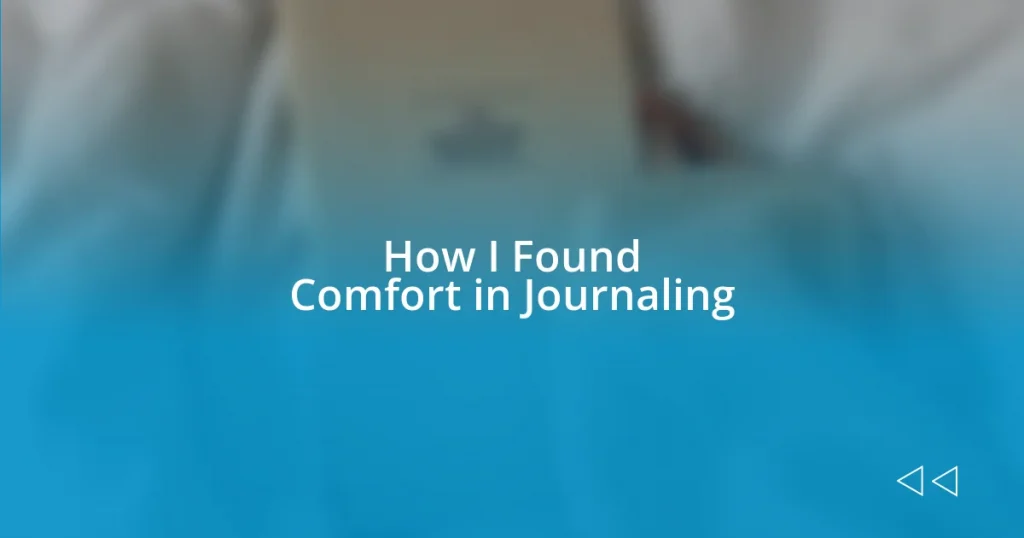Key takeaways:
- Journaling serves as a therapeutic tool, offering clarity in decision-making and fostering emotional healing through self-exploration.
- Establishing a consistent journaling habit is essential; starting small, using prompts, and creating a dedicated space can enhance the practice.
- Reflecting on past journal entries can reveal personal growth and emotional patterns, deepening the connection with oneself.
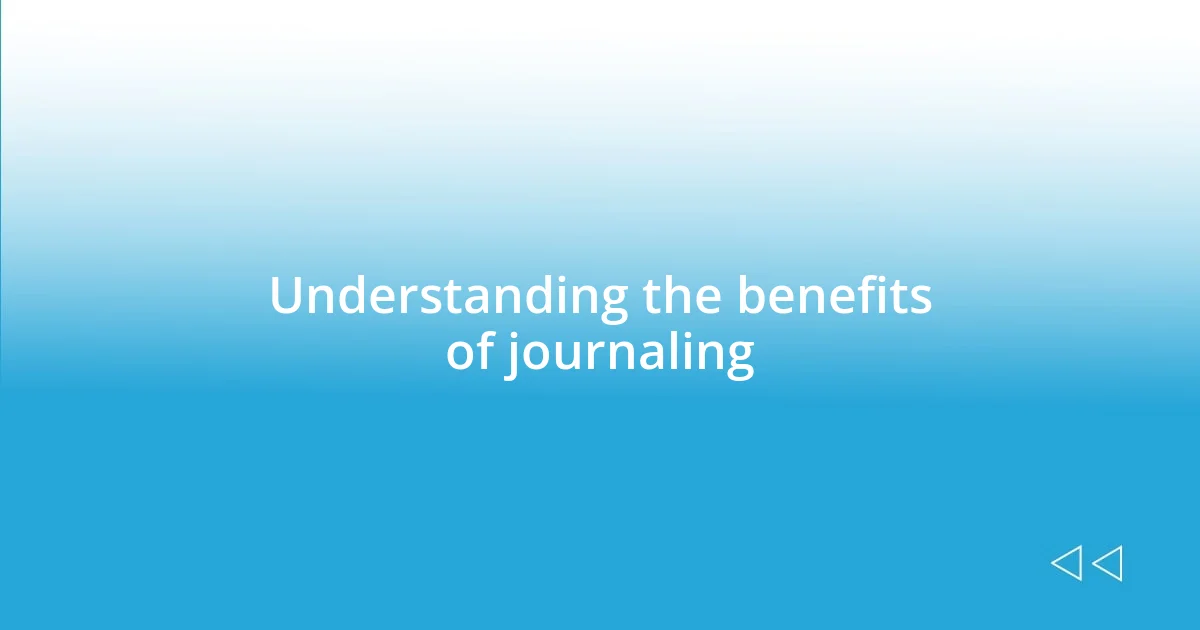
Understanding the benefits of journaling
Journaling offers a safe space for exploring thoughts and feelings, which can be incredibly liberating. I remember times when the chaos of my mind felt overwhelming, and putting pen to paper became my refuge. Have you ever felt that release, watching your worries transform into words?
Another remarkable benefit of journaling is the clarity it brings to my life decisions. I often find myself reflecting deeper when I jot down my dilemmas. It’s fascinating how writing can highlight patterns in my thoughts that I wouldn’t notice otherwise. Do you ever feel stuck, unsure about your next steps? Writing can serve as a trusted guide during those moments.
On a more profound level, journaling fosters emotional healing. I still think about a difficult period in my life when I felt lost and disconnected. Writing allowed me to confront my pain in a way that felt manageable and transformative. Could this simple act of writing be a key to unlocking our inner strength? The more I wrote, the clearer it became that my voice matters and that healing is a journey worth taking.
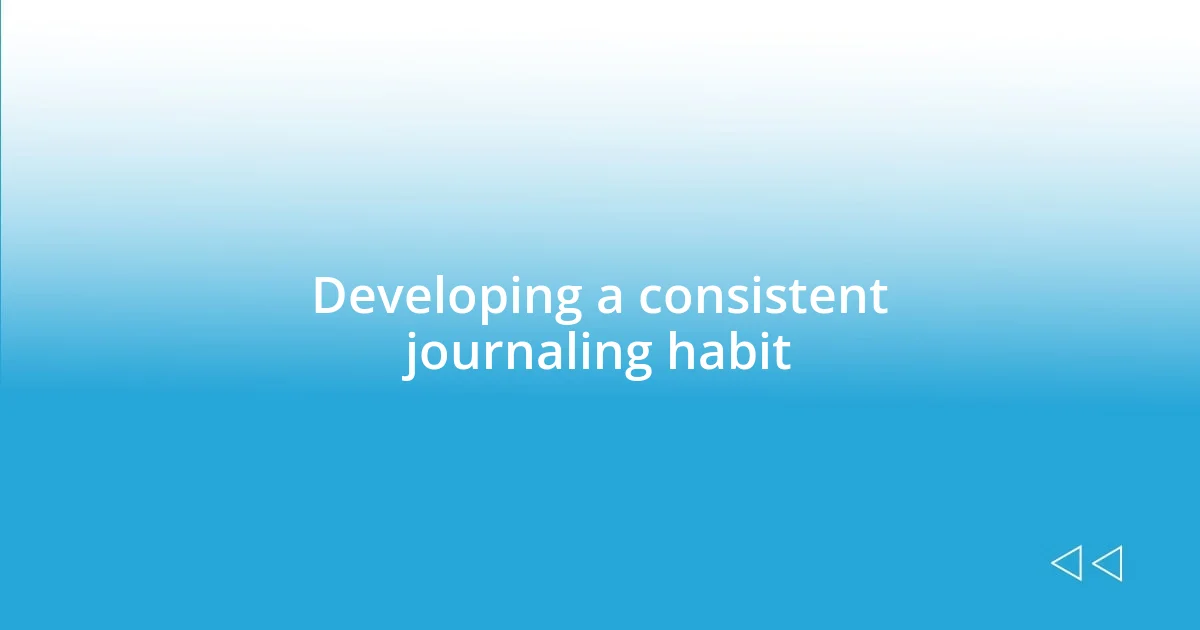
Developing a consistent journaling habit
Establishing a consistent journaling habit can be a bit tricky at first, but I’ve found that starting small is key. I remember when I first began, I set a timer for just five minutes. That short duration felt manageable, and it was amazing how much I could spill onto the page in that little time. Now, that initial burst of writing often expands into longer sessions because I’ve come to treasure those moments.
To help you develop your own journaling routine, consider these tips:
- Set a specific time: Choose a time of day that works best for you—whether it’s morning coffee or bedtime.
- Create a cozy space: Designate a spot that feels inviting, inspiring creativity.
- Use prompts: If you ever find yourself staring at a blank page, writing prompts can spark your imagination.
- Don’t worry about perfection: Allow yourself to write freely, and remember that this is for you, not an audience.
- Track your progress: Keep a calendar to mark off the days you journalled. Seeing your consistent effort can be incredibly motivating.
The process of weaving journaling into my daily life has not only helped me find clarity but has also added a comforting rhythm to my days. It’s the simple act of showing up for myself that cultivates not just habit, but a sense of deep belonging within my own narrative.
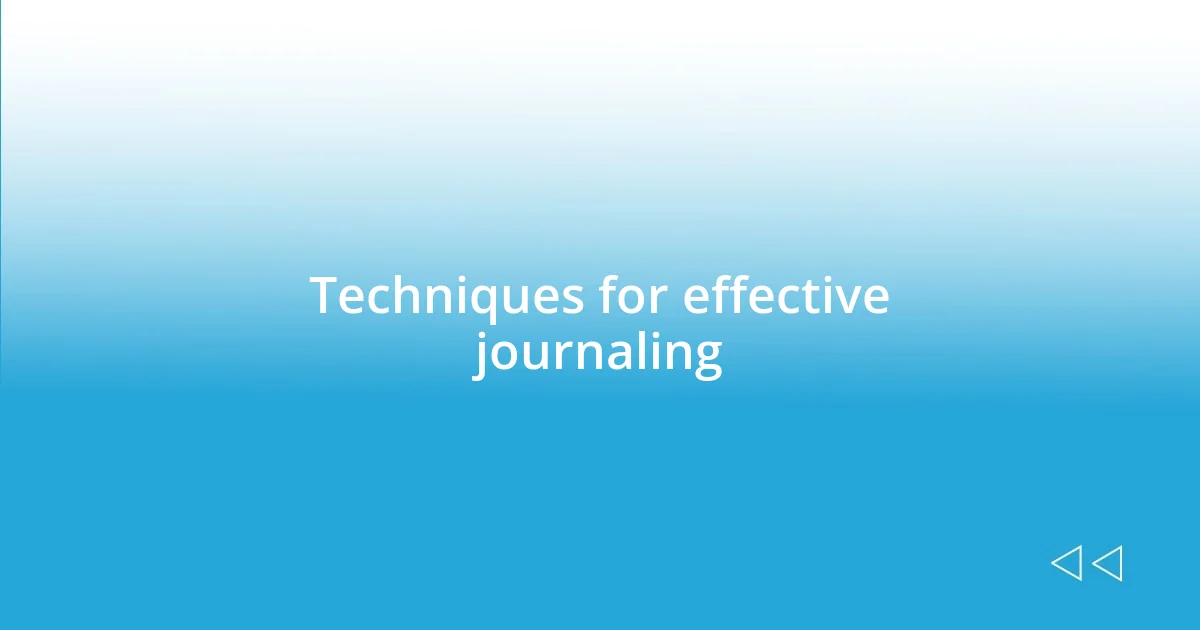
Techniques for effective journaling
When it comes to effective journaling, choosing the right technique can make all the difference. For instance, I’ve found that mind-mapping my thoughts allows me to visually explore complex feelings. It’s almost like drawing a treasure map of my emotions. Have you ever tried to illustrate your feelings in that way? I encourage you to give it a shot!
Another technique I adore is writing letters—either to someone or to myself. This allows for an intimate exploration of my thoughts and emotions. I remember writing a letter to my future self once; it was both reflective and aspirational. Those moments of vulnerability can help clarify what truly matters to me. Have you considered what you would want to say to yourself in a year?
Lastly, I often engage in gratitude journaling. Each night, I write down three things I’m thankful for. Focusing on gratitude shifts my mindset from stress to appreciation, and I sleep better as a result. It’s incredible how this simple act can reshape my outlook and bring peace at the end of the day.
| Technique | Description |
|---|---|
| Mind Mapping | A visual representation of thoughts and feelings, helping to clarify complex emotions and ideas. |
| Letter Writing | Writing to someone or yourself, fostering intimacy and reflection on personal feelings and aspirations. |
| Gratitude Journaling | Documenting three things you’re thankful for each day to shift focus from stress to appreciation. |
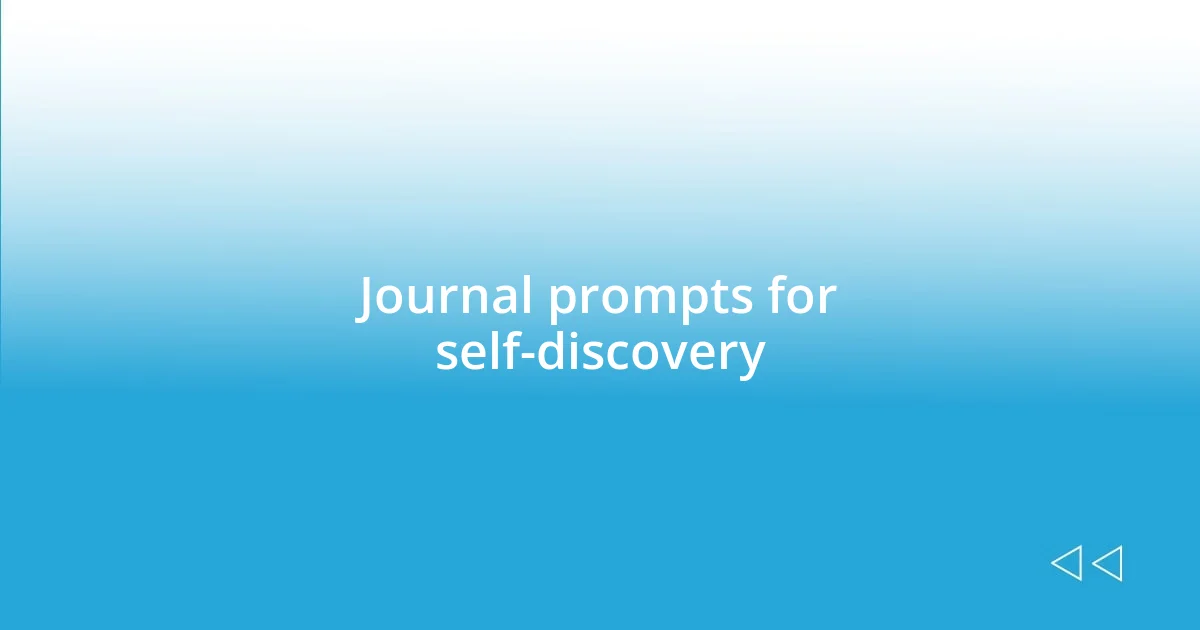
Journal prompts for self-discovery
When I think about journal prompts for self-discovery, a few often come to mind that really dig deep. For instance, I once wrote, “What does my ideal life look like?” This question turned into a beautiful exploration of my hopes and dreams. It was fascinating to see how my vision changed as I filled the page—what once felt impossible began to take shape as a tangible goal.
Another prompt I find powerful is, “What fears are holding me back?” Reflecting on this question brought up emotions I hadn’t addressed before. I recall writing about my fear of failure and how it had been affecting my decisions. This straightforward inquiry opened the floodgates to an honest dialogue with myself. Have you ever confronted a fear through writing? It can be incredibly liberating.
On a lighter note, I enjoy asking myself, “What brings me joy?” On days when I felt overwhelmed, listing the small moments of joy—like my morning coffee or a walk in the park—helped refocus my perspective. That simple act of writing down what lights me up turned into a delightful reminder of the beauty in everyday life. Isn’t it amazing how such small reflections can shift our mood?
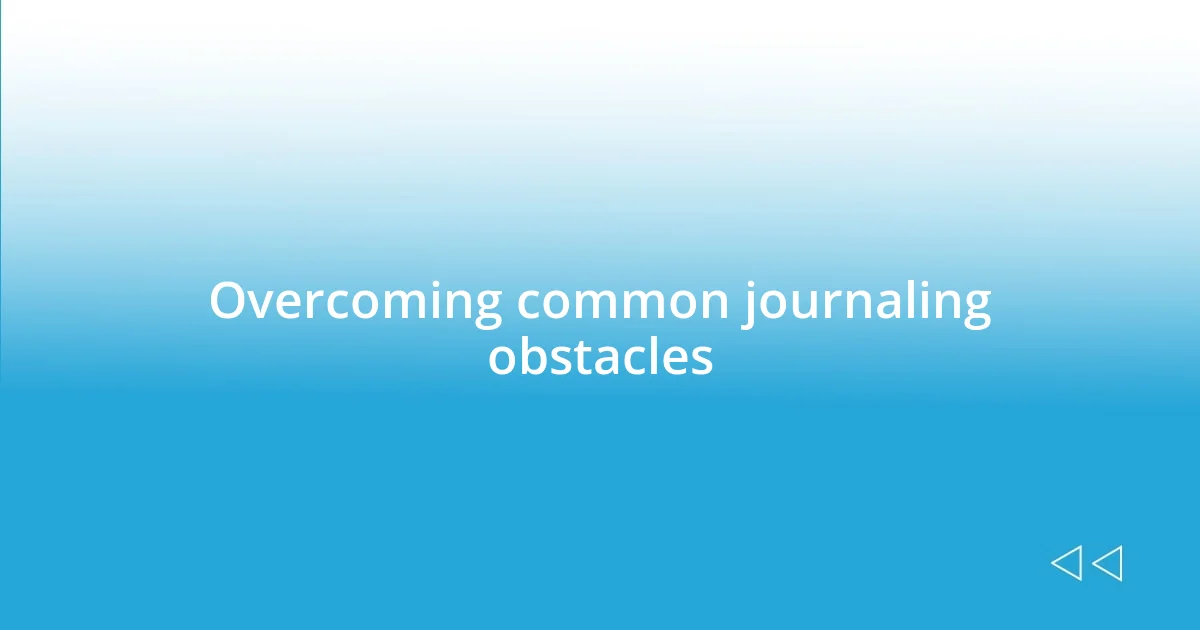
Overcoming common journaling obstacles
Finding the time to journal can be a significant hurdle. I remember the days when my schedule seemed packed to the brim. It felt overwhelming, and I convinced myself I didn’t have a spare moment. Then, I decided to start small—just five minutes before bed. Surprisingly, that tiny commitment turned into a cherished part of my routine. Have you ever felt like a little effort could uncover hidden gems in your day?
Another common challenge is the fear of not knowing what to write about. Early on, I often stared at the blank page, feeling paralyzed. I realized that it wasn’t about crafting the perfect entry; it was about honest expression. So now, I allow my thoughts to flow freely, and I embrace whatever comes out—just like a stream of consciousness. Sometimes, I even write a single word or phrase to kickstart the process. Have you ever tried jotting down a word that captures your mood? It can open doors to deeper reflections.
Feeling vulnerable while journaling can also be intimidating. I recall a time when I hesitated to write about my struggles, thinking they were too personal. Eventually, I pushed through that discomfort and transformed those feelings into powerful entries. The act of writing became a safe space, allowing me to confront my emotions with clarity. Isn’t it fascinating how vulnerability can lead to growth? Embracing that discomfort has often been the first step toward healing for me.
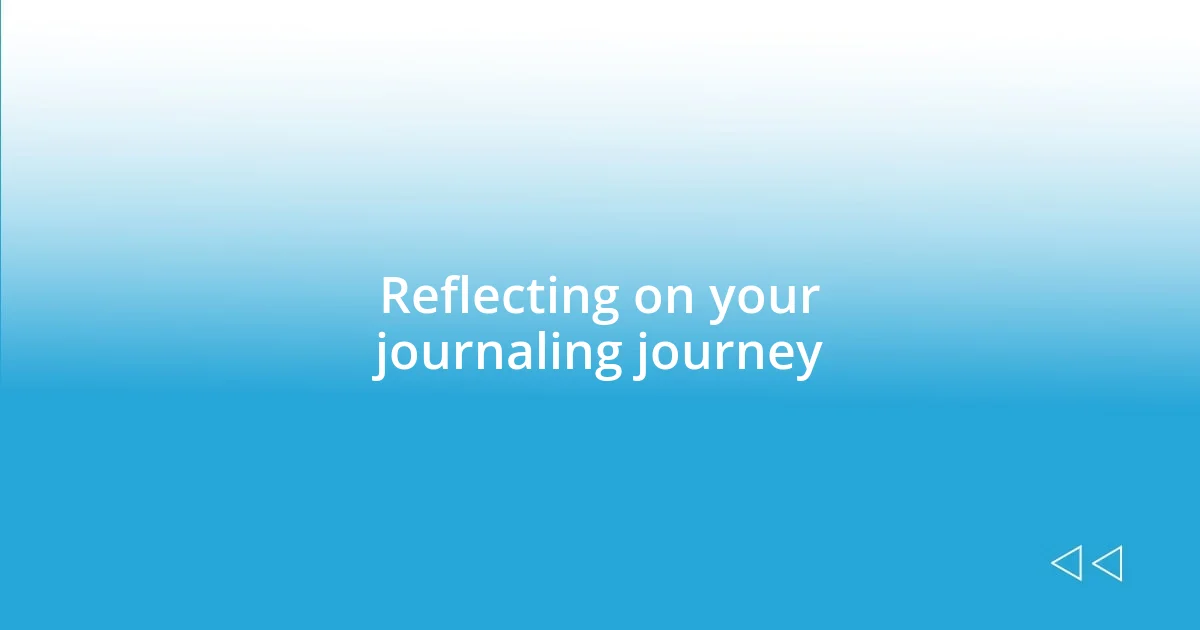
Reflecting on your journaling journey
Reflecting on my journaling journey has been like flipping through an old photo album, each page revealing moments I forgot I cherished. I remember once stumbling upon an entry where I vented about feeling lost after a tough breakup. As I read it, I felt a mix of sadness and gratitude; the words captured my pain but also reminded me of the resilience I built through those struggles. Have you ever revisited an old entry and been surprised at how far you’ve come?
One thing that continually strikes me is the evolution of my writing style and emotional depth over time. Early entries often felt stilted and formal, as if I was trying to impress someone rather than just be myself. But as I grew more comfortable with the process, I noticed my voice becoming softer, more authentic. This shift allowed me to play with language and emotions, crafting narratives that feel true to who I am. Does your writing voice change when you reflect on your experiences?
The most profound realization for me was understanding the patterns in my thoughts and feelings. By periodically revisiting my journals, I spotted recurring themes—like my need for balance and the anxiety surrounding major life decisions. Each page turned into a mirror, reflecting not just who I was but who I was becoming. This ongoing dialogue with myself has created a deeper connection, almost like nurturing a friendship with my own thoughts. Have you found similar patterns in your writing? It really can be a lightbulb moment when you discover what deeply resonates with you.











